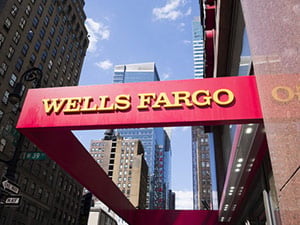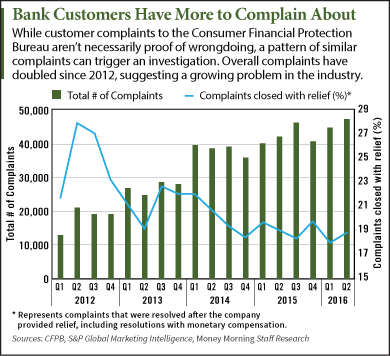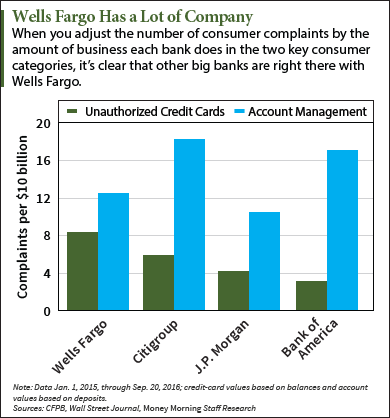Even as the outrage over the Wells Fargo scam was running high, many already had started to wonder if the same kind of customer abuse happens at other big banks.
Digging into what evidence we have, it's clear the answer is yes. The only question is how pervasive it is.
We know that at Wells Fargo & Co. (NYSE: WFC), such behavior was widespread. Workers created 2 million fake accounts from May 2011 to July 2015 in a desperate attempt to fulfill unrealistic sales quotas.
 At the root of the Wells Fargo scam was an unhealthy obsession with "cross-selling," in which workers were encouraged to get customers to buy multiple bank products.
At the root of the Wells Fargo scam was an unhealthy obsession with "cross-selling," in which workers were encouraged to get customers to buy multiple bank products.
Customers were frequently pushed to add an unneeded checking account or credit card account. Because that rarely yielded enough new accounts to meet quotas, the heavily pressured bank workers resorted to creating fake accounts.
So far in the Wells Fargo scam, the U.S. Consumer Financial Protection Bureau has fined the bank $185 million. The state of California announced it would suspend its "most profitable business relationships" with the bank for at least one year. And on Wednesday, CEO John Stumpf resigned following weeks of withering criticism, including from many members of Congress.
Related: How the Wells Fargo Scam Pulverized Customers' Credit Scores
But the emphasis on cross-selling was not unique to Wells Fargo. Most major banks with large consumer businesses also do it...
Why the Wells Fargo Scam Could Be the First of Many Like It
"Wells Fargo isn't the only one. This is an industry-wide problem," one former banker, who requested anonymity, told CNNMoney last month.
Wells Fargo was the role model, though. It boasted in earnings calls of selling more than six products per customer -- double the industry average.
Other banks were envious. The more business a customer does with a bank, the more the bank earns from that customer in the form of fees. Plus, each additional account deepens the relationship between bank and customer, making it less likely they'll jump to a rival bank.
The profit motive, however, is very high. Since 2008, bank profits have been pinched by historically low interest rates as well as higher regulatory costs.
While we don't have the kind of damning evidence against other banks that resulted in the public spectacle of the Wells Fargo scam, there's plenty of smoke.

A CFPB database shows that the average number of consumer complaints about all banks have doubled from about 20,000 per month in 2012 to 40,000 per month in the past year.
Although Wells Fargo figures prominently in the CFPB database, it doesn't particularly stand out.
Get Our Best Wealth-Building Ideas: Money Morning's top 5 investment reports to grow your money like never before are right here - and they're absolutely free. Read more...
In addition, a June study by the National Employment Law Project (NELP) revealed that the practices exposed in the Wells Fargo scam are disturbingly common. The researchers interviewed 75 workers from a range of banks in 18 states. According to the report, the interviews make it "clear that Wells Fargo is not alone in implementing these policies."
While none may be as bad as Wells Fargo, the data suggests several prominent banks easily could end up with cross-selling scandals of their own...
The Banks Most Likely to Get Caught in a Cross-Selling Scandal
Several of the banks that turned up in the NELP study may come as a surprise, such as SunTrust Banks Inc. (NYSE: STI), U.S. Bancorp (its branches use the U.S. Bank name) (NYSE: USB), and Banco Santander SA (NYSE ADR: SAN).
[mmpazkzone name="in-story" network="9794" site="307044" id="137008" type="4"]
The statements from workers under pressure to meet cross-selling sales goals at these banks sound disturbingly similar to those made by those who worked for Wells Fargo.
"There was a constant battle of how you do right for the customer without sacrificing, you know, not paying a light bill or having shoes for the kids going back to school. You can't make that sacrifice," one U.S. Bank worker told the NELP researchers.
But the biggest banks are the ones most likely to be the next find themselves in the CFPB's crosshairs. A MarketWatch review of the CFPB database showed that the banks with the most complaints about account openings and closings were (in order) Bank of America Corp. (NYSE: BAC), Wells Fargo, JPMorgan Chase & Co. (NYSE: JPM), and Citigroup Inc. (NYSE: C).
Several of these banks, particularly Bank of America, turned up often in the NERP interviews.
"If someone's getting married, tell them to get a credit card. Any life event that happened, you were supposed to say 'get a credit card for it.' If you heard kids in the background, the answer was a credit card," a Bank of America service specialist said.

A survey taken last year by consulting firm cg42 asked customers specifically about whether their bank pressured them to buy products they didn't need.
Among Wells Fargo customers, 40% complained about such sales pressure. But other big banks weren't far behind. For Bank of America, it was 31%. For Chase and Citigroup, the figure was 27%.
Numbers like these suggest the next cross-selling scandal is a question of when, not if.
"We put the industry clearly on notice. We will be looking for these types of problems," CFPB head Richard Cordray told CNBC in September after dumping the $185 million fine on Wells Fargo.
Some big banks already are getting nervous.
JPMorgan CFO Marianne Lake told CNBC today (Friday) that the bank is currently conducting a "deep dive" into possible sales transgressions.
For investors, the Wells Fargo scam has put a dark cloud not just over Wells Fargo stock, but the stocks of the entire banking industry. Wells Fargo faces months, if not years, of investigations and lawsuits related to its cross-selling issues.
For other bank stocks, it's the risk of the unknown. Investors can't know which bank might get exposed next. For now, it's best to avoid this troubled sector.
Next Up: What's Next for Deutsche Bank After the Failed Bailout Attempt
Follow me on Twitter @DavidGZeiler or like Money Morning on Facebook.
Related Articles:
- CNNMoney: 'Wells Fargo Isn't the Only One': Other Bank Workers Describe Intense Sales Tactics
- NELP: Banking on the Hard Sell (PDF)
About the Author
David Zeiler, Associate Editor for Money Morning at Money Map Press, has been a journalist for more than 35 years, including 18 spent at The Baltimore Sun. He has worked as a writer, editor, and page designer at different times in his career. He's interviewed a number of well-known personalities - ranging from punk rock icon Joey Ramone to Apple Inc. co-founder Steve Wozniak.
Over the course of his journalistic career, Dave has covered many diverse subjects. Since arriving at Money Morning in 2011, he has focused primarily on technology. He's an expert on both Apple and cryptocurrencies. He started writing about Apple for The Sun in the mid-1990s, and had an Apple blog on The Sun's web site from 2007-2009. Dave's been writing about Bitcoin since 2011 - long before most people had even heard of it. He even mined it for a short time.
Dave has a BA in English and Mass Communications from Loyola University Maryland.



